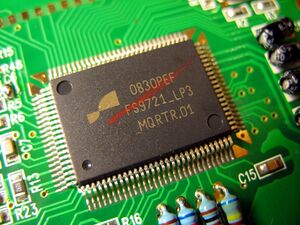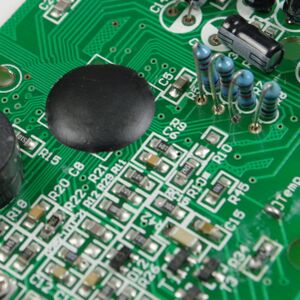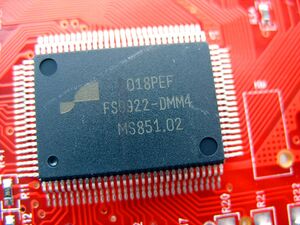Difference between revisions of "Multimeter ICs"
Jump to navigation
Jump to search



Uwe Hermann (talk | contribs) m (Uwe Hermann moved page Fortune Semiconductor FS9721 to Multimeter ICs) |
Uwe Hermann (talk | contribs) (Fortune Semiconductor FS9922-DMM4) |
||
| Line 1: | Line 1: | ||
This page lists some information about ICs commonly used in various multimeters (DMMs). | |||
= Fortune Semiconductor FS9721_LP3/FS9721B = | |||
[[File:Voltcraft vc820 fs9721 lp3.jpg|thumb|right|FS9721_LP3 on [[Voltcraft VC-820]].]] | |||
[[File:Tp4000zc_chip.jpg|thumb|right|FS9721 (?) on [[TekPower TP4000ZC]].]] | |||
== Protocol == | == Protocol == | ||
| Line 4: | Line 11: | ||
The upper nibble of each byte indicates the byte number. The payload is composed of the lower nibbles, and is a 1-1 mapping of the LCD segments. The downside to this protocol structure is that transmission errors in the LSB nibbles cannot be detected. There is no checksum or CRC in the packet. | The upper nibble of each byte indicates the byte number. The payload is composed of the lower nibbles, and is a 1-1 mapping of the LCD segments. The downside to this protocol structure is that transmission errors in the LSB nibbles cannot be detected. There is no checksum or CRC in the packet. | ||
'''Packet structure:''' | |||
{| border="0" width="50%" style="font-size: smaller" class="alternategrey sigroktable" | {| border="0" width="50%" style="font-size: smaller" class="alternategrey sigroktable" | ||
| Line 129: | Line 136: | ||
|} | |} | ||
'''Segment lettering:''' | |||
{{7seg|C|B|G|F|A|E|D}} | {{7seg|C|B|G|F|A|E|D}} | ||
== | = Fortune Semiconductor FS9922-DMM3 = | ||
TODO. | |||
= Fortune Semiconductor FS9922-DMM4 = | |||
[[File:Uni-t ut61d fs9922-dmm4.jpg|thumb|right|FS9922-DMM4 in a [[UNI-T UT61D]].]] | |||
The [http://www.ic-fortune.com/eng/ Fortune Semiconductor] FS9922-DMM4 ([http://www.ic-fortune.com/upload/Download/FS9922-DMM4-DS-11_EN.pdf datasheet]) is a widely used 6000-count auto-ranging DMM chip: it takes input from the various controls on the front panel, drives the LCD display, and can communicate its readings via a serial port. | |||
== Protocol == | |||
TODO | |||
Revision as of 21:23, 1 November 2012
This page lists some information about ICs commonly used in various multimeters (DMMs).
Fortune Semiconductor FS9721_LP3/FS9721B

FS9721_LP3 on Voltcraft VC-820.

FS9721 (?) on TekPower TP4000ZC.
Protocol
The chip periodically sends 14-byte packets at 2400 baud, 8n1. The upper nibble of each byte indicates the byte number. The payload is composed of the lower nibbles, and is a 1-1 mapping of the LCD segments. The downside to this protocol structure is that transmission errors in the LSB nibbles cannot be detected. There is no checksum or CRC in the packet.
Packet structure:
| Byte | Bits 7-4 | Bit 3 | Bit 2 | Bit 1 | Bit 0 |
|---|---|---|---|---|---|
| 0 | 0x1 | AC | DC | Auto | RS232 |
| 1 | 0x2 | Negative | 1A | 1B | 1C |
| 2 | 0x3 | 1D | 1E | 1F | 1G |
| 3 | 0x4 | DP1 | 2A | 2B | 2C |
| 4 | 0x5 | 2D | 2E | 2F | 2G |
| 5 | 0x6 | DP2 | 3A | 3B | 3C |
| 6 | 0x7 | 3D | 3E | 3F | 3G |
| 7 | 0x8 | DP3 | 4A | 4B | 4C |
| 8 | 0x9 | 4D | 4E | 4F | 4G |
| 9 | 0xa | u | n | k | Diode |
| 10 | 0xb | m | % | M | Beep |
| 11 | 0xc | Farads | Ohms | Rel | Hold |
| 12 | 0xd | A | V | Hz | Low battery |
| 13 | 0xe | User bit 3 | User bit 2 | User bit 1 | User bit 0 |
Segment lettering:
| C | ||
| B | G | |
| F | ||
| A | E | |
| D |
Fortune Semiconductor FS9922-DMM3
TODO.
Fortune Semiconductor FS9922-DMM4

FS9922-DMM4 in a UNI-T UT61D.
The Fortune Semiconductor FS9922-DMM4 (datasheet) is a widely used 6000-count auto-ranging DMM chip: it takes input from the various controls on the front panel, drives the LCD display, and can communicate its readings via a serial port.
Protocol
TODO